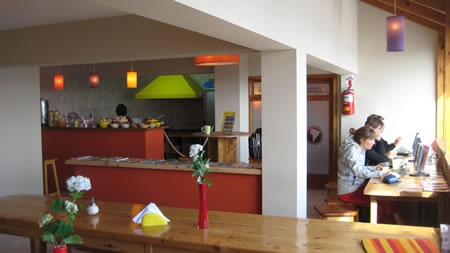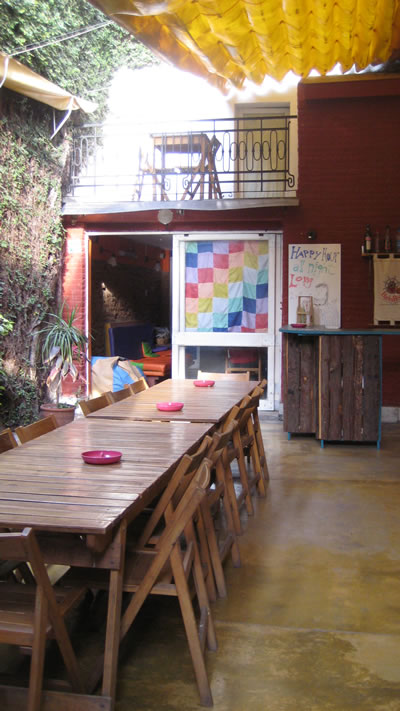Extend Your Travels Abroad with Hostel Jobs
How to Find Work at Hostels in South America
Article and photos by Isabel Eva Bohrer
9/2/2010 with resources updated 10/21/2023 by Transitions Abroad

Are your travels more limited by money than by time? Finding work at a hostel might be a remedy for your dilemma. Working in exchange for accommodations or food is becoming increasingly common among travelers. In some places, foreigners are running the local establishments entirely. Travelers know how to cater to travelers. Here’s how you can become part of the catering in South America.
The First Step
In short, two options exist for setting up work at a hostel. You can arrange a placement beforehand, or once you have arrived on site. Though the latter is more common, both are possible, but depending on various factors, one might work better for you.
Arranging Work from Abroad
If you know from the start that you want to work at a hostel, setting up a job placement in advance might be advantageous. Again, there are several options.
Googling a hostel job abroad will yield results, as some hostels advertise online for positions. Agencies and organizations such as Contact Chile and ChileVentura can set you up with work at a hostel for about $500, guaranteeing a job upon arrival. Workaway, for a minimal membership fee, offers work exchange programs where hosts do not pay. Still, you are provided room and board in exchange for your work. Depending upon the prevailing demand, postings change all the time. If you are looking for a job in a specific location or even at a particular hostel that you locate or that you find with a hostel search engine, an email or even calling them up is always worth a shot. But just as a note of caution, this is South America we are talking about; people may not reply, or even if they do, their answers could change by the time you actually arrive. Use your judgment and common sense to evaluate the responses you receive. Go to a hostel where one of your friends or relatives has stayed.
Getting Hired On-Site
Whether or not working at a hostel is part of your initial travel plans, it can become a reality once you are abroad. In fact, some hostels require that you show up in person before they hire you; this way, they not only know that you are already in-country but can also evaluate whether you are the kind of person they want to hire. But don’t let that scare you off; after staying in several hostels in South America, you will find that getting hired is much less formal than you expect. Usually, there is no set procedure, which is why it is a lot more common to be hired on-site than from abroad.
Getting a job is often the result of becoming friends with the people who either already work at the hostel or own the place entirely. In such a case, travelers who were initially guests are the ones who end up becoming employees. Some hostels, such as Penthouse 1004 in Bariloche, Argentina, will have signs saying they are looking for people to join their staff. Others, such as La Casa Roja in Santiago, Chile, had a waitlist of travelers looking to work there when I went there in search of work. And establishments such as Hostel Independencia in Mendoza, Argentina, have a steady staff of locals who run the place perfectly.

Bottom line: Finding a job at a hostel in South America can be hit-or-miss. It can involve going around town to various hostels to scout out a position or being extremely persistent to find the one you want. The latter was the case with Seba de Praxis, an Argentinean seeking to work at the Hostel Inn in Bariloche. Despite the abundance of hostels in Bariloche, he only wanted to work at this particular one. His downfall, however, was that he knew little English. Nevertheless, he was hired after an intensive language course and much perseverance.
The Essentials
The previous example introduces some fundamental skills necessary to work at a hostel. Languages, especially English, are a must. So are people skills and persistence. And if you have specific skills, such as web page design or cooking, flaunt them as well.
Reeve, a current employee of La Casa Roja, started by offering his epicurean talent when his funds dwindled; having graduated from a culinary institute, he would suggest cooking travelers their food if they let him eat with them afterward. His story was successful; he now cooks for the entire hostel twice a week! Arturo, a permaculture fanatic, came to El Bolsón in Patagonia to complete a construction course at CIDEP. After completing the course, he was hired for a work exchange at La Casa del Viajero to construct a new cabaña (guest house).
Regardless of your specific skills, arriving at a place just before high season is advantageous. While most guidebooks may clue you in on high and low seasons, keep in mind that other unexpected factors may enter the equation. For example, the earthquake in Chile decreased tourism; even during Easter, hostels received fewer guests, which meant less demand for hostel employees.
The Work
After all this talk about getting a job, what is the position? Of course, the kind of work will vary from hostel to hostel. To offer examples: at La Casa Roja, 18 hours of work per week will get you free accommodations. Work hours combine shifts at reception, bar, cleaning rooms, and bathrooms. While 18 hours may not seem like much, don’t expect to make your own schedule; that is up to the supervisor. Keep in mind that night shifts are part of the deal.
The above is usually the standard for hostels in larger or mid-sized cities. If organizing the next pub crawl is not your thing, then Patagonia might be an option. Work may include gardening, watering plants, chopping wood, and construction. La Casa del Viajero, for example, offers travelers the possibility of working in exchange for accommodations. Demand for work may vary (all the wood might be chopped already), so don’t count on it. The Casa also has one or two regular volunteers working there long-term in exchange for accommodations and a food stipend.
Is Working at a Hostel Right for Me?
While working at a hostel may be a great way to extend your travels, it is not a job for everyone. More often than not, working at a hostel requires a minimum time commitment that some travelers cannot meet. But even more than the required time frame, only some are cut out for the responsibilities necessary to work at a hostel. Cleaning bathrooms is nobody’s idea of fun, but some may dislike the task more than others. Coming from an academic background, some people may not feel mentally challenged by simply checking in guests. Night shifts at a reception can also be long and tedious. While some places, such as La Casa Roja, have separate rooms for employees, you will usually live among travelers in a dorm room. Life can get noisy, and privacy is limited.
However, having limited privacy and a series of noisy nights does not discount the advantages that hostel work can bring. No doubt you will get to know people from all over the world, as well as having access to the culture of the locals that surround you (make sure to actually leave the hostel in which you work to do so!). It is possible to work and live at a hostel all your life, but even a couple of months can really enrich your travels.
Isabel Eva Bohrer is the Director and Founder of ROOSTERGNN Global News Network, a non-profit news agency.
|
